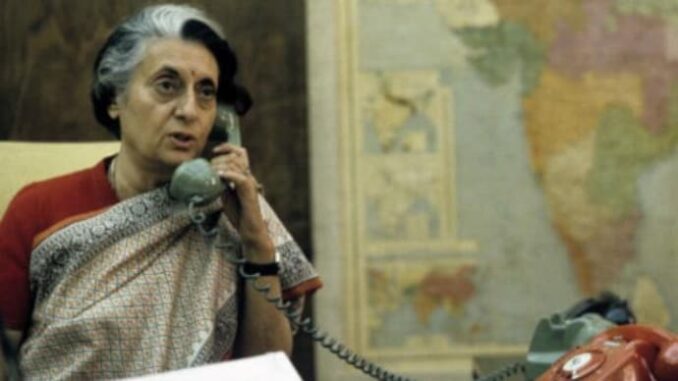
India’s emergency was a 21-month period from 1975 to 1977 during which Prime Minister Indira Gandhi ordered a state of emergency to be imposed nationwide. The Emergency was declared by President Fakhruddin Ali Ahmed by Article 352 of the Constitution and was in force from June 25, 1975, to March 21, 1977, when it was officially lifted. The order granted the Prime Minister the power to rule by decree, enabling the cancellation of elections and the suspension of civil rights. The majority of Gandhi’s political opponents were imprisoned for a significant portion of the Emergency, and the media was restricted. Other purported human rights violations during the time included a widespread vasectomy campaign led by her son Sanjay Gandhi. One of the most contentious eras in Indian history since independence is the Emergency.
In July and August 1975, the Cabinet and the Parliament approved Indira Gandhi’s last proposal to declare an emergency, which had been approved by the President of India. Its foundation was the idea that the Indian state was under immediate internal and external threat.
Along with the limitations on civil liberties, there was a crackdown on unions during the Emergency. According to reports, the government enacted fixed pay without room for bonuses and prohibited worker strikes and union activities. The workers who resisted this were severely repressed. Sanjay Gandhi’s nationwide program of mass sterilization and the clearance of slums without much warning to slum residents were additional contentious aspects of this period.
Before the Emergency was lifted on March 21, 1977, Indira Gandhi called for new elections on January 18. She had also mandated the release from custody of other opposition figures.
The Emergency, which was characterized by rampant state incarceration, the suppression of opposition, and an assault on civil freedoms, is frequently seen as a terrible chapter in the history of independent India. There have been reports of a lot of press censorship and frequent abuses of human rights.
Table of Contents
The court decision that led Indira Gandhi to impose emergency measures
One of the events that contributed to the declaration of the Emergency was the June 12, 1975 judgment of the Allahabad High Court, which found the then-prime minister Indira Gandhi guilty of electoral fraud and barred her from holding any political office.
Raj Narain, a socialist politician, was soundly defeated by Indira Gandhi in the 1971 Lok Sabha election for the Rae Bareli Lok Sabha constituency in Uttar Pradesh. Raj Narain later contested Indira Gandhi’s victory, claiming electoral fraud and a breach of the 1951 Representation of the People Act. It was suspected that she exploited government employees for personal election-related tasks, including her election agent Yashpal Kapoor, who worked for the government. In addition to disqualifying Indira Gandhi from serving in Parliament and placing a six-year ban on her holding any public office, Justice Sinha found her guilty of electoral fraud.
Declaring the State of Emergency
Interestingly, Indira Gandhi declared the Emergency the very following day, suspending all fundamental rights, imprisoning opposition leaders, and instituting media control.
The just-finished war with Pakistan was listed as one of the threats to national security by the Congress government. A few party members, including the then-chief minister of West Bengal, Siddhartha Shankar Ray, persuaded Indira Gandhi to move forward with the proposal even while many in the party continued to oppose it. According to historians, Sanjay Gandhi, the younger son of the prime minister, had also developed into a supporter of “extra-constitutional” measures and was therefore in favor of his mother’s declaration of the Emergency.
The Emergency’s legacy
Even nearly 50 years later, the Emergency’s mixed legacy ensured that the subject would always be highly debated in India’s hyperpartisan political environment.
In time, the Congress and the Bharatiya Janata Party grew deeply divided over the issue of the Emergency (BJP). Many of the senior officials of the Rashtriya Swayamsevak Sangh (RSS) were detained during this time, and BJP leaders have made it a point to draw attention to it frequently in their public speeches.
On June 25, 2019, Prime Minister Narendra Modi paid tribute to all “those greats” who fought against the Emergency that had been established on this day in 1975 by then-Premier Indira Gandhi and declared that democracy had won out over dictatorship.
What took place throughout the Emergency?
There was a suspension of constitutional rights. Gandhi’s political rivals, including LK Advani, Atal Bihar Vajpayee, Morarji Desai, and JP Narayan, were all put behind bars. Press censorship was practiced at this time. Sanjay Gandhi also organized a mass sterilization programme.
The Union government was given complete authority. During this time, the 42nd Amendment to the Constitution was also adopted.
Aftermath:
There was an emergency lasting 21 months. The government announced that elections would be held soon in January 1977. In the elections of March 1977, Congress was soundly defeated. The first non-Congress government in independent India was formed by the opposition leaders who came together to found the Janata Party.

Leave a Reply